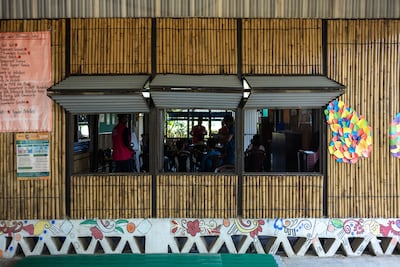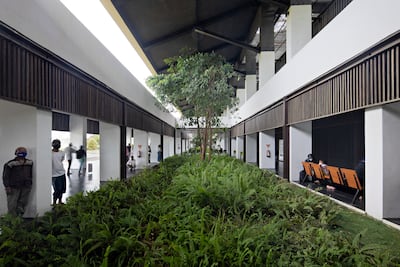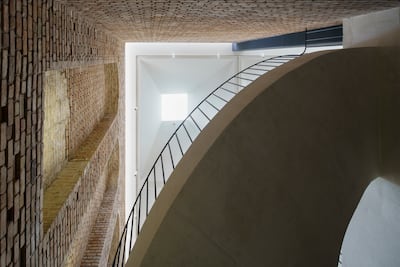A Lebanese guesthouse, a Bangladeshi refugee space, a Senegalese school and a museum in Iran are among the winners of the $1 million Aga Khan Award for Architecture, now in its 45th year.
The six award winners will share the prize pot, one of the largest in architecture, for an award that was established in 1977 by the Aga Khan to reward building projects and designs that address the needs of communities with significant Muslim populations.
Tripoli guesthouse

The renovation of Lebanon's Niemeyer Guest House in Tripoli is one of the projects. It “is an inspiring tale of architecture's capacity for repair, at a time of dizzying, entangled crisis around the world, and in Lebanon in particular”, the jury said.
On the outskirts of the city, the building stands inside an entrance to the Rachid Karami International Fair, a project by architect Oscar Niemeyer that has been left derelict and unfinished after the country's civil war halted it in 1975.
The 10-hectare fair site is a widely celebrated example of Modernist architecture in the Middle East.
The single-storey guesthouse, transformed by East Architecture Studio, appears windowless from the outside and yet is flooded with light via a central atrium and two courtyards.
Community spaces in Bangladesh

Bangladesh's Urban River Spaces, a former dump site that has been transformed into a multifunctional space used by communities in Jhenaidah, is part of an initiative to clean the Nabaganga River.
“As such, the project managed to reverse the ecological degradation and health hazards of the river and its banks and induce effective ecological improvement of the river in one of the most riverine countries on earth,” an extract from the jury citation said.
Future plans at this project include the introduction of walkways, gardens, cultural facilities and efforts to increase biodiversity in the area.
Six temporary community spaces of the Rohingya Response programme in Cox's Bazaar also received the award, as they provide “dignified, sensitive and ingenious response to emergency needs”.
These comprise a women-friendly space that encompasses psychosocial support, a breastfeeding area and a courtyard for women and girls to play. Another zone offers space for Rohingya women to craft products and sell them to visitors, while a third serves Hindu Rohingya communities with domestic violence issues.
An airport in Indonesia

In Indonesia, the Banyuwangi International Airport in East Java, designed by architect Andra Matin, caught jury members' eyes. It is described as a “game-changer in airport architecture”.
It was inspired by the houses of the local Osing tribe and features two pitched-roof structures covered in grass and crowned with timber-frame, asymmetrical pyramidal skylights that pay homage to the traditional Banyuwangi headdress.
“Arising from a sea of a paddy fields, the building extends the language of the landscape into a concentrated event that coalesces architecture, functionality and setting in a seamless yet discernible disposition,” the jury said.
Tehran museum and Senegalese school

In Iran, the Argo Contemporary Art Museum and Cultural Centre has also received international recognition.
The jury described it as an “untypical” reuse and conservation project, as it transformed a former brewery into a private museum for contemporary art, with spaces for exhibitions, talks and film screenings across four floors.
The project retained the “full integrity and raw beauty of the historic building”, judges said, through the use of steel columns, reinstated brickwork and a white concrete staircase, as well as a brass public bar. Five pitched-concrete roof structures “appear to float above the building — a 'tip of the hat' symbolising its return to life”.
The final winner is the Kamanar Secondary School in Senegal, a complex that “addresses the multiple scales of urbanism, landscape, architecture and building technologies with equal commitment and virtuosity”.
The site's topography and flora, which includes a grid of classroom pods centred around pre-existing foliage, are especially striking features.
2022 Aga Khan Award for Architecture
These winners were chosen from a shortlist of 20 projects, which in turn were whittled down from a pool of 463. On-site reviews by a team of experts were undertaken to devise the final list.
“We wanted our collective message to reflect the extraordinary times we are living in, from Covid and climate change to social polarisation, poverty, inequality and conflict,” the master jury report said.
“To that end, we sought to identify exemplary and transformative practices that address these particular challenges.”
The jury looked for “quality, not only of the architectural space, but the quality of life and social relationships facilitated by architecture — the generosity and beauty that architecture can strive to make more accessible”.
Jury members this year included architects Nada Al Hassan and Lina Ghotmeh, artist Kader Attia and professor Amale Andraos.
An award ceremony will soon take place in Muscat, Oman, in conjunction with the Aga Khan Music Awards.





















